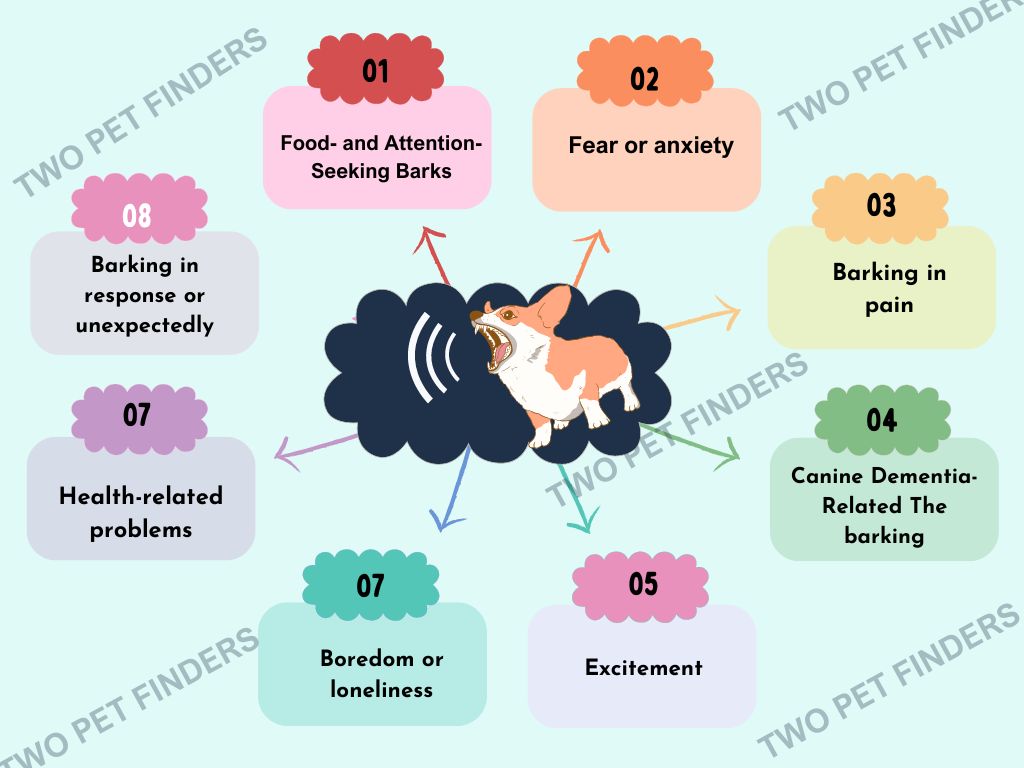An Answer (short & tongue-in-cheek) to Why Does My Dog Bark so Much? is they are dogs and that is how they relate to one another. But that answer usually does not solve anything and even less give you a good blog post. Well, let us get deeper, shall we? First, some basics about barking to get you moving in the right direction.
8 reasons for your dog’s barking

Here’s a summary of the most common reasons dogs bark so you can better understand what your dog is trying to tell you.
Food- and Attention-Seeking Barks
Dogs might bark to let you know they’re hungry, or that they need attention. Often this behavior is attention-seeking and demands affection from their owners. Barking, well they bark at what they wish for, if indeed they are to get it either food-wise or play-wise.
Grasp The Line Between Essential And Unnecessary To Provide A Healthy Lifestyle For Your Pet Boss Training and providing appropriate mental and physical stimulation might be necessary in order to reduce the barking caused by them. This would certainly increase pet-owner bonding.
Fear or anxiety
When Dogs bark out fear or unease This behavior can be caused by loud noises, strange environments or even past traumatic experiences. Negative temperament in dogs may manifest as barking too much which can be managed effectively as long as the reason for the fear or anxiety are dealt with through positive reinforcement training, desensitization, and ensuring the dog stays safe at all times. The dog may also help to assist control and decrease the dogs concerns and anxiety by consulting with a qualified dog trainer or veterinarian.
Barking in pain
A dog barking in pain means there is an issue that has to be addressed sooner, in the installation of an underlying cause. But there are also painful / acutely painful conditions, such as injury/internal disorder or dental complaints that can lead to barking. Recognizing shifts in behavior, body language, any kind of distress Immediate veterinary care is needed to diagnose the type of poisoning and its treatment. Failing to address barking during physical pain can perpetuate the state and cause unnecessary suffering. This can include anything from comforting the dog, giving him pain relief as prescribed by a vet and creating a quiet environment to help the dog deal with his discomfort. The Key to Keeping Our Furry Friends Healthy and Happy Pain-related barking should be quickly recognized and addressed to maintain the optimal health and comfort of our dogs.
Canine Dementia-Related The barking
Older dogs may suddenly bark at imagined dogs or whatever and could even bark through the night. Would an older animal be cognitively impaired? The barking could be unprovoked and not come in response to anything.
Anyhow if you catch your senior dog barking a specific wall or corner at night, schedule an appointment with you veterinarian to figure out what can be done to make your senior dog more comfortable.
Consulting with a veterinarian for a proper diagnosis and developing a tailored treatment plan can improve the quality of life for dogs suffering from dementia-related barking.
Excitement
When a dog is happy about something, such getting ready for a walk, seeing their owner home, or trying something new, they may bark.
Happy surprises aren’t just for people! Our canines occasionally become uncontrollably excited.
Boredom or loneliness
Why My Dog Is Barking: Are They Bored and Lonely Or Will They Need A Pacifying And Reassuring Human Alert?
Dogs that never stop seeking out our time and attention, possibly are experiencing a combination of boredom and loneliness, and will become quiet and peaceful for 10 to 20 minutes, and then return to their complaining whenever they become bored or lonely again. You are guarded against tedium through mental challenges, interactive toys and guided walks.
Giving your beagle playtime or a doggy daycare will keep it busy and entertained, even if it eliminates loneliness0 This will assist you in deciding what to do with your pet and also give you an idea why your dog is barking so much.
Health-related problems
Some medical or cognitive disorders may result in more vocalization, and some dogs will bark when they are in pain. Animals being in emotional and physical pain that causes Barking! Older dogs barking can be a way of expression pain, injury, or cognitive impairment, or any other underlying medical condition or discomforts.
Barking in response or unexpectedly
Dogs may bark suddenly or in response to external stimuli. Several things, including sounds, motions, or alterations in their surroundings, may cause them to behave in this way. One way to control and lessen excessive barking is to recognize the situation and deal with any possible triggers. Creating a quiet, consistent atmosphere and offering positive reinforcement training are two other strategies to stop this behavior.
How can I train my dog to stop barking?
Dog training can be tricky, so you need a proper balance of patience, consistency while understanding why dogs bark.
Step 1: Find out the underlying by the Barking is it due to boredom, anxiety or territorial behavior. When these are recognized, train positive reinforcement for periods of quiet and calm with treats and praise.
Also ensure that they have plenty of mental and physical stimulation with regular exercise and interactive toys to keep away boredom and excess energy. To teach a “quiet” command, reward silence with treats and praise when your dog is not barking.
Practice this command regularly, always rewarding for stillness and increasing the duration of stillness over time.
Do not shout or punish, as this can trigger distress and further encourage barking. Instead, stick to a positive and patient training method.
If you need the practical advice and support of a pro dog trainer, seek help. Through regular training and reinforcement, you should be able to effectively get your dog under control regarding quieting down.


